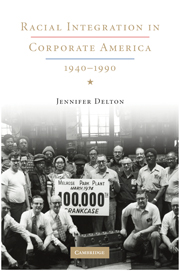Book contents
- Frontmatter
- Contents
- List of Tables
- Introduction
- PART I COLOR-BLIND GROUNDWORK, 1940–1961
- 1 The African American Struggle for Jobs
- 2 Fair Employment Is Good Business
- 3 Racial Liberalism and the Mid-Twentieth-Century Businessman
- 4 Human Relations in Management
- 5 Human Relations at International Harvester and Pitney-Bowes
- PART II COLOR-CONSCIOUS ASCENDANCY, 1961–1990
- Epilogue: From Affirmative Action to Diversity
- Statistical Tables
- Bibliography
- Acknowledgments
- Index
- References
1 - The African American Struggle for Jobs
Published online by Cambridge University Press: 05 June 2012
- Frontmatter
- Contents
- List of Tables
- Introduction
- PART I COLOR-BLIND GROUNDWORK, 1940–1961
- 1 The African American Struggle for Jobs
- 2 Fair Employment Is Good Business
- 3 Racial Liberalism and the Mid-Twentieth-Century Businessman
- 4 Human Relations in Management
- 5 Human Relations at International Harvester and Pitney-Bowes
- PART II COLOR-CONSCIOUS ASCENDANCY, 1961–1990
- Epilogue: From Affirmative Action to Diversity
- Statistical Tables
- Bibliography
- Acknowledgments
- Index
- References
Summary
The struggle to be gainfully employed is one of the central stories of African American history. Segregation, racism, violence, and a large supply of immigrant labor limited black workers' participation in the American workforce to a few circumscribed areas at the lower end of the pay scale. The details of exclusion varied geographically and changed over time, but until the latter half of the twentieth century, labor unions, employers, and the state upheld or promoted exclusionary employment policies that barred blacks from what came to be called “traditionally white jobs.” In the late nineteenth and early twentieth centuries, strikebreaking and labor shortages had been the surest paths into traditionally white jobs for African Americans. By World War I, however, black leaders began to pursue economic opportunities in a more organized fashion. The National Association for the Advancement of Colored People (NAACP), founded in 1909, the National Urban League, founded in 1920, and black leaders such as A. Philip Randolph, W. E. B. Du Bois, Walter White, and Clarence Mitchell worked tirelessly for what eventually became known as “fair employment” and later “equal opportunity.” After years of cajoling, lawsuits, protests, boycotts, data collecting, and industry-by-industry “experiments,” their arguments and efforts would eventually convince organized labor, employers, and the state that racial discrimination was bad for unions, bad for business, and bad for the nation.
- Type
- Chapter
- Information
- Racial Integration in Corporate America, 1940–1990 , pp. 17 - 41Publisher: Cambridge University PressPrint publication year: 2009



